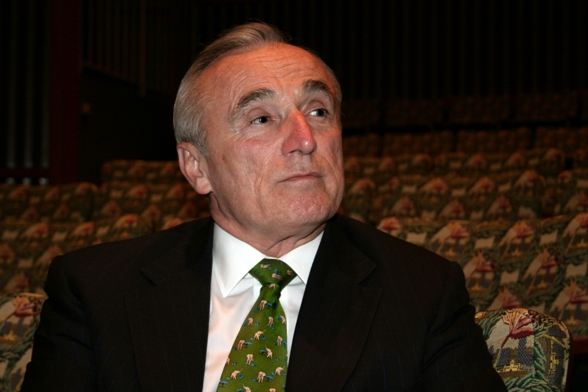
William J. Bratton was born and raised in Boston, in a working class family that “didn’t have a great deal of money, but there was always a contentment to our lives. We didn’t realize how little we had. Nobody else had anything either.” But Bratton did have books, particularly an illustrated children’s text, Your Police, and the novel The Commissioner, both of which convinced him, at the ripe age of 10, that he wanted to be Police Commissioner of New York. It was, he said, “kind of far-fetched. But it happened.” Read more about the Los Angeles police chief’s life and career below.
Q. What do you wake up to?
A. I normally wake up to an alarm, around five in the morning.
Q. What comforts you?
A. A sense of satisfaction when things are going well, whether professionally or personally.
Q. What inspires you?
A. I’m inspired by the profession I’m in and the impact we have on people’s lives, and by having intriguing problems and issues to work on and successfully addressing those problems and issues.
Q. How would you describe yourself in five words or fewer?
A. Highly energized and very happy.
Q. If you could live in any time, past, present or future, when would it be and why?
A. The 1940s, during World War II. I’ve always been intrigued by that period of time that my parents grew up in…. It seemed to have been a special time in the country when there was a lot of uniformity in being united against the issues of fascism and Japanese expansion in the Pacific.
Q. When do you feel most creative?
A. I’m creative at all times…. There’s no particular time that I’m more energized than other times.
Q. What is your greatest extravagance?
A. Probably eating out, which I do all the time.
Q. If you could take only one more journey, where would you go?
A. To a place I vacation very frequently, the Amalfi Coast in Italy.
Q. What profession would you like to practice in your next life?
A. Same one I practice in this life. I’m very happy doing what I do.
Q. Whose talent would you like to have?
A. I’m quite happy with my own.
Q. What is your most prized material possession?
A. There are a number of badges from my various positions that I’ve held, and several books going back to my childhood that were instrumental in shaping my choice to be a police officer.
Q. What teacher or professor changed your life?
A. Two teachers simultaneously impacted my life. One was an art teacher in college, Dr. Aibinites, he taught at Boston City College in the 1960s. Through the appreciation of art he allowed me to become very appreciative of the differences of people. While you may not like the way somebody looks or dresses, you have to look beyond that. …Renaissance art, for example, I don’t like at all, but I appreciate its importance in the transition of art and the transition of human experience.
The other was Betsy Useem. She taught urban geography in college…. At a time when most people were proclaiming the death of the American city, she was talking about how important cities were to the vitality of our country…. It’s helped me realize how important police are to the well-being of cities, and how important police are in allowing everybody to be themselves. You can be anything you want to be as long as you obey the law, whether you’re white or black, whether you’re hip or not, whether you choose to dress in one style or another.
Q. What promise do you make to yourself that you break the most often?
A. None. I’m not one for New Year’s resolutions. It’s not what I do.
Q. If you could have a beer with any person, living or dead, who would you choose?
A. Probably several. There aren’t too many people I’d walk across the room to say hello to. But I am a great admirer of actors of old Hollywood, before actors became the cast of characters they are today…. I would’ve liked to have met the giants, the Humphrey Bogarts, the John Waynes…. I’ve never met but would have liked to meet Ronald Reagan, along with John F. Kennedy, and back in the Civil War era, General Grant.
*Photo by Aaron Salcido.



